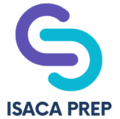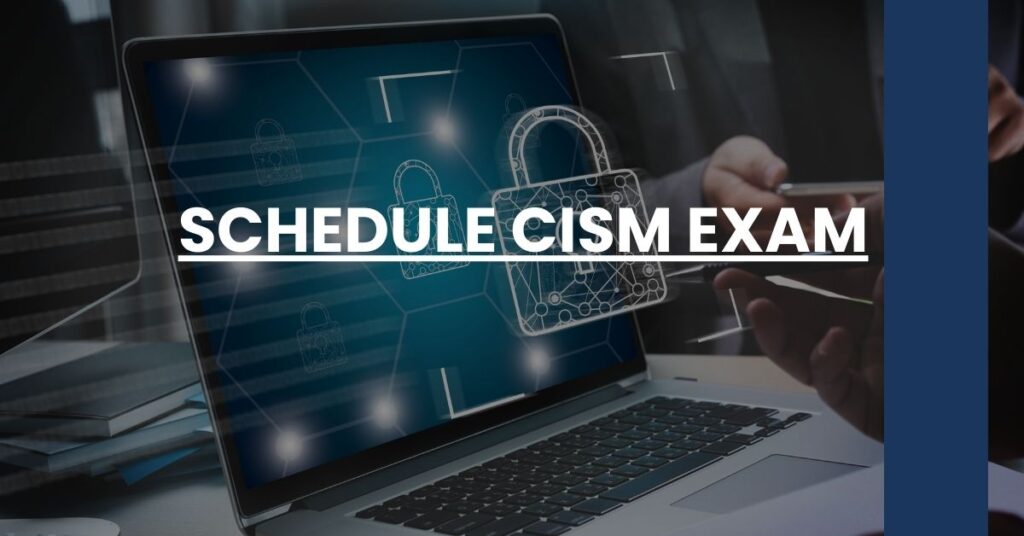Looking to schedule your CISM exam? Find out how to secure your testing spot for this crucial certification.
- Choose the Right Exam Date: Select a date that gives you ample time to prepare for the CISM exam.
- Understand Eligibility: Ensure you meet the criteria before scheduling to avoid any setbacks.
- Navigate the ISACA Portal: A smooth experience in scheduling your CISM exam through the official ISACA portal.
Ready to schedule your CISM exam? Start your path to certification today.
- Understanding CISM Certification and Its Importance
- Eligibility Requirements for the CISM Exam
- Step-by-Step Process to Register for the CISM Exam
- Choosing the Best Time to Take the CISM Exam
- Overview of CISM Exam Scheduling Options
- Exam Centers and Location Selection
- What to Expect on the Exam Day
- Understanding the CISM Exam Structure
- Exam Day Tips and Best Practices
- CISM Exam Fee Structure and Payment Methods
- Rescheduling, Cancellation, and No-Show Policies
- Next Steps After Scheduling the CISM Exam
- Conclusion: Preparing for Success on the CISM Exam
Understanding CISM Certification and Its Importance
Certifications in the world of information security are not just badges of honor; they are critical milestones in a cybersecurity professional’s journey. Among these, the Certified Information Security Manager (CISM) stands tall. It is a globally recognized certification that demonstrates an individual’s expertise in managing, designing, and overseeing an enterprise’s information security.
Holders of CISM certification are seen as trusted experts, possessing advanced skills in risk management, incident response, governance, and developing security programs. Notably, earning a CISM certification can provide significant career velocity, elevating you to leadership roles such as CISO, IT Security Manager, or Security Consultant.
Why is CISM Essential for Security Managers?
- Career Advancement: CISM opens doors to higher-level positions.
- Enhanced Credibility: It adds substantial weight to your professional profile.
- Global Recognition: A CISM tag aids in being part of a global network of security leaders.
- Higher Earnings Potential: Certified professionals typically command better salaries.
When you decide to earn a CISM certification, you’re making a strategic move that could redefine your role in the cybersecurity landscape.
Eligibility Requirements for the CISM Exam
Start your CISM journey by ensuring you meet the eligibility requirements. Unlike some exams that anyone can attempt after some study, the CISM exam demands practical experience in information security management.
Understanding Pre-requisites for the CISM Exam
- Work Experience: You must have a minimum of five years of work experience in information security, with at least three years of experience in three or more of the CISM domains.
- Waivers for Education and Experience: There are opportunities for a waiver of up to two years based on higher education and other certifications.
Secure the prerequisites and your pathway to sit for the CISM exam becomes clear.
Step-by-Step Process to Register for the CISM Exam
You’re ready? Fantastic. Now, the question is, how do you actually schedule your CISM exam? Here’s a step-by-step guide to walk you through the registration labyrinth.
1. Creating an ISACA Account
Start by establishing your professional profile on ISACA’s website. If you already have an account, make sure all your personal details are up to date.
2. Payment and Scheduling
Upon completion of your profile, proceed to the payment section and choose your exam. Once the fee is settled, you’re ready to schedule your exam through the PSI dashboard, ISACA’s exam-providing partner.
3. Selecting Your Exam Slot
ISACA provides the flexibility of multiple testing dates. It is your prerogative to select a slot that suits your preparation status and personal convenience.
By handling the registration process with due diligence, you fortify your first step towards attaining the coveted CISM title.
Choosing the Best Time to Take the CISM Exam
Selecting the optimal time to take your exam is as crucial as scheduling it. The CISM exam isn’t simply about knowledge; it’s about the application of that knowledge under the pressure of a strict time limit.
Factors to Consider When Scheduling Your Exam
- Preparation: Most candidates invest at least three months in preparation. Plan your exam date accordingly.
- Personal Obligations: Make sure your chosen date doesn’t clash with significant personal commitments.
- Professional Workload: Aim for a period when your workload is manageable, allowing you to be in the right frame of mind for the exam.
Time your exam for when you can be at your best, both mentally and academically.
Overview of CISM Exam Scheduling Options
Being strategic about your exam date can be the edge you need. ISACA offers a generous range of options, designed to fit around your busy schedule.
Exam Windows and Scheduling Flexibility
- Testing Windows: The exam is offered during specified windows throughout the year.
- Scheduling in Advance: Appointments can be made up to 90 days in advance, allowing ample time for preparation.
- Late Scheduling: Last-minute decision-maker? You can schedule as soon as 48 hours after payment, subject to availability.
Choose a date that aligns smoothly with your study plan and professional life.
Exam Centers and Location Selection
Finding the right place to take your exam is straightforward. ISACA has partnered with PSI to offer a network of testing centers around the globe, as well as a remote proctoring option for your convenience.
Deciding on Your Ideal Testing Environment
- Local Testing Centers: Access the list of authorized PSI testing centers and pick one close to you to cut down on travel stress.
- Remote Proctoring: If you prefer your comfort zone or if distance is an issue, remote proctoring is an excellent alternative.
Whichever option you choose, ensure it is in a setting where you can concentrate and perform at your best.
Selecting the right exam center or remote proctoring option is the final step before focusing entirely on your exam preparations. You’re now locked in and ready to conquer the CISM exam with confidence.
What to Expect on the Exam Day
Approaching your CISM exam day with clarity on what to expect can significantly ease your nerves and set you up for a smooth experience. Here’s a detailed walkthrough.
Before You Leave Home
- Identification: Double-check that you have an acceptable form of identification, which typically includes a government-issued ID with your photograph and signature.
- Confirmation Number: Keep your exam confirmation number handy, as you’ll likely need it upon arrival at the testing center or for remote proctoring check-in.
- Exam Policies: Familiarize yourself with any specific policies of the testing center or requirements for remote proctoring.
Arrival at the Testing Center
- Early Arrival: Plan to arrive at the testing center at least 15 minutes early to accommodate check-in procedures.
- Check-In: Expect to undergo a standard check-in process, which may include ID verification, capturing your photograph, and possibly storing your belongings in a secure location.
Remote Proctoring Experience
- Test Environment: Ensure your testing area is free from distractions and adheres to ISACA’s remote testing environment requirements.
- Technical Check: Perform a technical check of your computer system against the specifications provided for the CISM exam’s remote proctoring.
By understanding these expectations, you’re one step closer to confidently tackling the CISM exam.
Understanding the CISM Exam Structure
The better you understand the structure of the CISM exam, the more precisely you can focus your study efforts. Here’s what to keep in mind:
Breaking Down the Exam Format
- Duration: You will have four hours to complete the exam.
- Number of Questions: The CISM exam consists of 150 multiple choice questions.
- Content Areas: Questions are distributed across key practice areas of information security management, with varying degrees of weightage.
Delve into these areas as you tailor your study plan, matching the exam’s inner workings with your preparation.
Exam Day Tips and Best Practices
Your performance on the CISM exam can be influenced by the approach you take on the day of the test itself. Here are some strategic nudges.
Strategies to Optimize Your Exam Performance
- Time Management: Keep an eye on the clock without letting it dominate your focus.
- Question Analysis: Read each question thoroughly, ensuring you understand what is being asked before answering.
- Paced Approach: It’s important to move at a steady pace to avoid rushing or dwelling too long on any one question.
These practices are a culmination of your hard work and could be decisive in your success.
CISM Exam Fee Structure and Payment Methods
Understanding the financial commitment required for the CISM exam is critical to your planning process.
Know the Costs
- Exam Fee: The expense of taking the exam differs for ISACA members and non-members, with members enjoying a discounted rate.
- Additional Fees: Budget for any potential extra fees, such as an application fee or membership costs, to avoid any surprise charges.
By preparing for these expenses, you’ll ensure that the cost doesn’t become a barrier to your certification success.
Rescheduling, Cancellation, and No-Show Policies
Life can be unpredictable, which is why it’s vital to be aware of ISACA’s policies regarding any changes to your CISM exam appointment.
Understanding the Fine Print
- Rescheduling: Know that you can reschedule your exam without a penalty if done at least 48 hours before your scheduled appointment.
- Cancellations: Cancellations are also subject to specific rules and may incur fees if not conducted within the specified timeframe.
Familiarize yourself with these policies so that, should you need to make a change, you’re fully informed.
Next Steps After Scheduling the CISM Exam
Once you’ve locked in your exam appointment, your attention turns singularly to preparation for this critical assessment.
Advancing Your Study Efforts
- Review Materials: Take advantage of official ISACA study materials, including the CISM Review Manual.
- Practice Tests: Engage with practice exams to gauge your readiness and identify areas that need more focus.
- Study Groups: Consider joining or forming a study group for collaborative learning and support.
These next steps are essential to solidify your understanding and prepare you for the questions you’ll face.
Conclusion: Preparing for Success on the CISM Exam
Scheduling your CISM exam is an important milestone in your information security career. The process outlined above is designed to guide you through every step, from ensuring eligibility to exam scheduling and all the way through to your test day.
Remember, it’s not just about being knowledgeable in information security management practices; it’s about being well-prepared, mentally composed, and strategic in your exam approach. By understanding the exam structure, optimizing your performance through best practices, and comprehending the fee and rescheduling policies, you position yourself for the best possible outcome.
Take these insights and embed them in your preparation strategy. As you progress, remember that these steps were designed to contribute to your overarching goal: success on the CISM exam and the subsequent advancement of your career.
Now, with the clarity provided by this guide, reflect on how you can incorporate this knowledge into your study plan. Focus on your preparation with the understanding of what lies ahead, and approach your CISM exam with confidence. Best of luck!

